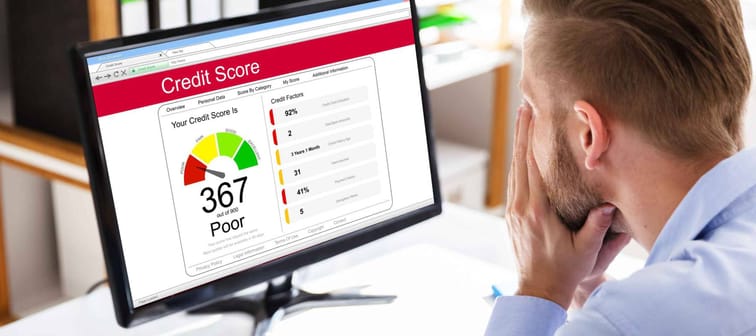6 reasons why your credit score might have dropped
So why exactly did your credit score drop? There are a few possible reasons for your recent credit reporting issues. Some will be fairly obvious, but others can be confusing if you’re unfamiliar with how scores are calculated.
Either way, it’s important to pinpoint what could’ve hurt your credit score so that you don’t make the same mistake again.
1. You made a late payment or completely missed a payment
No big surprise here, but your credit score can drop when you miss a payment on your credit card or any other bill. We know it’s frustrating. Life can get stressful and it’s easy to accidentally forget to pay that credit card balance or to just be a few days late on making a payment.
I was hit with a credit score deduction once because I got a new credit card and forgot to update my payment details with my cell phone provider. I didn’t notice anything and thought I was in the clear until one day my phone had no service. I promptly made my payment, but it was too late. I had missed the deadline. I had a late payment on my credit history.
Payment history accounts for roughly 35% of your credit score. According to Borrowell, missing a bill deadline could decrease your credit score by up to 150 points. (You can keep on top of your score by registering for free credit score monitoring with Borrowell.)
2. You closed a credit card
Have you closed a credit card account recently? While you may think that closing a credit card is a wise move for your financial situation, the credit bureau sees it otherwise.
I was going through an airport many years ago and was tempted to sign up for a credit card so that I could get a free bag. All I had to do was apply for a credit card and I would get this bag as a gift. What a sweet deal I thought this was. A few weeks later, a brand spanking new credit card arrived in the mail. Naturally, I didn’t actually want this card. I immediately wanted to cancel it until a friend informed me that this would hurt my credit score.
Your credit history is 15% of your credit score and closing a credit card could cause a credit score reduction of a few points.
3. You have a high balance
If you carry a high balance on your credit card, this could be hurting your credit score since credit utilization is 30% of your credit score.
In our Ultimate guide to gredit scores, we explain it like this: “Credit utilization refers to the amount of credit that you are using relative to the amount that is allotted to you. For instance, if you have a credit card with a $1,000 credit limit, and you have a balance of $200 on that card, it’s a 20% credit utilization.”
It has been speculated that maxing out your credit cards can drop your credit score by up to 50 points.
4. You paid off a loan recently
As counterintuitive as it may sound, your credit score could have a temporary dip if you pay off a balance. This is discouraging to hear, but the rationale for it makes sense once you understand how credit scores are calculated.
So, why does your credit score drop after paying off a balance? These are a few possible reasons:
- The average age of your accounts has gone down. Your credit history is now impacted.
- Your credit mix isn’t as diverse now. There are installment accounts (car loans) and revolving accounts (credit cards). So if you paid off your only installment account, you now only have revolving credit.
- You closed the account after paying off the balance. One less account impacts your credit utilization ratio.
5. You have inaccurate information on your credit report
As important as it is to check your credit score, you should also be going over your credit report to ensure all of the information is accurate. All Canadians are entitled to one free credit report per year from each of the two credit bureaus, TransUnion and Equifax.
Someone I know had their phone hacked. And the hackers opened a bunch of accounts with online retailers. For some reason, one of the retailers filed a missed payment with the credit bureau for this, even though there was no official purchase made. So this person had a mistake on their credit report that they weren’t even aware of.
Your credit report could also have some other issues on it, such as:
- Same debt listed more than once
- A payment incorrectly reported as late
- An inaccurate balance
There could also be other issues on your credit report if you’ve ever been a victim of identity fraud. This is why you have to go over your credit report. A simple mistake on your credit report (like a false missed payment) could hurt your credit score by up to 150 points.
6. You’ve checked your credit score too many times
While Equifax and TransUnion are the two credit bureaus for Canadian consumers, the score that lenders typically check isn’t from either of those, but rather from FICO, a US-based data provider.
When you apply for any kind of loan, the lender will pull your credit score with a hard check to find your FICO score (formerly known as a Beacon score). This could actually drop your credit score by up to 5 points according to FICO. So if you’ve been shopping for a mortgage or a car loan recently, this could’ve caused a drop in your credit score.
More: Does checking your credit score hurt your credit?
What happens if my credit score drops?
So, what are the consequences of your credit score dropping? After all, you didn’t mean for this to happen and now you’re confused about how this could impact your finances in the short-term.
Here are some ways you could be impacted by a credit score reduction:
- You may not get accepted for a premium credit card.
- Your credit limit may be lowered. When your credit score drops, this indicates to lenders that you aren’t trustworthy with credit. Not only could this reduce the limit of your existing card(s), but could also hurt your ability to apply for new credit.
- You’ll pay a higher interest rate on a loan (car loan, mortgage, etc.). This is a major deal. A higher interest rate on a car loan or home mortgage could cost you thousands of dollars over the term of your loan.
- Landlords will determine if you qualify based on your credit score. When you apply for a lease, the landlord will typically ask for your credit score.
- Some employers, particularly in government and financial services, may check your credit score as a term of employment. A low score could cost you the position.
As you can see, the impact of a significantly reduced credit score can be felt in many areas of your life. A late payment could impact everything from your ability to apply for a mortgage or car loan, to hurting your employment opportunities.
More: Get your free credit score with Borrowell
Is it common for your credit score to fluctuate?
Absolutely. Small mistakes like missing a bill payment could cause short-term drops in your score. But also, as your life changes, it’s common to have your credit score change with it. You go from a struggling college student to an adult with a higher income and additional responsibilities. You start signing up for more credit cards, you have easier access to credit, and you build a credit history.
More: What's the best age to get a credit card?
Why do I have different credit scores?
Every credit bureau uses a different modelling system to determine your credit score based on information that they pull from lenders. You should expect to have many different credit scores if you go looking through different bureaus, whether that’s the official credit bureaus like Equifax and TransUnion, or free credit score providers like CreditKarma and Borrowell.
Not only that, but as we mentioned earlier, there’s a difference between the credit score that you receive and what a business pulls when you apply for a loan. The FICO scoring model (previously the Beacon score) is a complex algorithm that determines your creditworthiness when you apply for a loan with a lender, and it won’t necessarily be identical to what the bureaus report.
Overall, you shouldn’t worry about slight variations in credit scores across different bureaus. The only time that you should worry is when there’s a massive difference of at least 100 points and you’re looking to apply for a loan in the near future. In this case, you’re going to want to check the respective credit reports to see what could be causing the discrepancy.
More: What's the average credit score in Canada?
What to do when your credit score drops
Your credit score has dropped and you’re feeling nervous about your financial situation. Let’s work on fixing this immediately.
Here are 4 things that you can do to improve your credit score right now:
- Go over your free credit report and look for errors that you can dispute. Ensure that everything’s accurate on your credit report. Do this semi-annually.
- Increase your credit limit. Can you try to increase the limit on one of your credit cards? However, this doesn’t mean you should spend more! The goal is to increase the limit without using the credit so that you can improve your credit utilization ratio.
- Apply for more credit. You may want to consider applying for a new credit card with no annual fees to boost your credit diversity and improve your credit history.
- Set up automated payments. The goal should be to never miss a payment deadline again. The best way to do this is to automate your payments.
If you can pinpoint the mistake and you know how to resolve it, then there’s nothing to stress about. All you can do is work on making the changes to improve your credit score promptly.
The only thing I would consider is waiting before applying for another loan. If your credit score is lower than you’d like, you may want to reconsider applying for that mortgage right now.
More: 7 ways to improve your credit score
When will your credit score improve?
This will all depend on what caused your credit score to drop in the first place. Your first late payment may only stay on for a billing cycle or two. While a major mistake like maxing out your credit score or defaulting on a loan, could bring your credit score down for much longer.
The final word
I know how anxiety-inducing it can feel when you’re working on your credit. But just remember that you can always improve your credit score. It’s never permanent. And don’t beat yourself up. If you take the right steps right now, your credit score will rebound and you’ll know how to keep improving your credit score in the future.
More: Get your free credit score with Borrowell
More: Best credit cards for a good credit score






